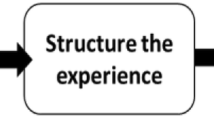Abstract
Despite almost two decades of interest in reducing gaming the system in interactive learning environments, gaming continues as a key factor reducing student learning outcomes and contributing to poorer learning outcomes. In this study, we redesigned the Kupei learning system by implementing a combined set of three interventions aimed at mitigating the impact of the two gaming behaviors we documented. Our results show evidence of a possible positive effect of the combined gaming prevention intervention at reducing the second type of gaming behavior within our system, however, it was not as successful at mitigating the first type of gaming behavior.
Access this chapter
Tax calculation will be finalised at checkout
Purchases are for personal use only
Similar content being viewed by others
References
Baker, R.S., Corbett, A.T., Koedinger, K.R., Wagner, A.Z.: Off-task behavior in the cognitive tutor classroom. In: Proceedings of the 2004 Conference on Human Factors in Computing Systems - CHI 2004, pp. 383–390 (2004)
Aleven, V., McLaren, B.M., Roll, I., Koedinger, K.: Toward meta-cognitive tutoring: a model of help seeking with a cognitive tutor. Int. J. Artif. Intell. Educ. 16, 101–128 (2006)
Pardos, Z.A., Baker, R.S., San Pedro, M.O.C.Z., Gowda, S.M., Gowda, S.M.: Affective states and state tests: Investigating how affect and engagement during the school year predict end of year learning outcomes. J. Learn. Anal. 1(1), 107–128 (2014)
Baker, R., et al.: Adapting to when students game an intelligent tutoring system. In: Ikeda, M., Ashley, K.D., Chan, T.-W. (eds.) ITS 2006. LNCS, vol. 4053, pp. 392–401. Springer, Heidelberg (2006). https://doi.org/10.1007/11774303_39
Arroyo, I., et al.: Repairing disengagement with non-invasive interventions. In: Proceedings of the International Conference on Artificial Intelligence in Education, pp. 195–202 (2007)
Murray, R.C., Vanlehn, K.: Effects of dissuading unnecessary help requests while providing proactive help. In: Proceedings of the International Conference on Artificial Intelligence in Education, pp. 887–889 (2005)
Aleven, V., McLaren, B., Roll, I., Koedinger, K.: Toward tutoring help seeking. In: Lester, James C., Vicari, Rosa Maria, Paraguaçu, Fábio. (eds.) ITS 2004. LNCS, vol. 3220, pp. 227–239. Springer, Heidelberg (2004). https://doi.org/10.1007/978-3-540-30139-4_22
Corbett, A.T., Anderson, J.R.: Knowledge tracing: modeling the acquisition of procedural knowledge. User Model. User-Adap. Inter. 4(4), 253–278 (1995)
Author information
Authors and Affiliations
Corresponding author
Editor information
Editors and Affiliations
Rights and permissions
Copyright information
© 2022 Springer Nature Switzerland AG
About this paper
Cite this paper
Li, Y., Zou, X., Ma, Z., Baker, R.S. (2022). A Multi-pronged Redesign to Reduce Gaming the System. In: Rodrigo, M.M., Matsuda, N., Cristea, A.I., Dimitrova, V. (eds) Artificial Intelligence in Education. Posters and Late Breaking Results, Workshops and Tutorials, Industry and Innovation Tracks, Practitioners’ and Doctoral Consortium. AIED 2022. Lecture Notes in Computer Science, vol 13356. Springer, Cham. https://doi.org/10.1007/978-3-031-11647-6_64
Download citation
DOI: https://doi.org/10.1007/978-3-031-11647-6_64
Published:
Publisher Name: Springer, Cham
Print ISBN: 978-3-031-11646-9
Online ISBN: 978-3-031-11647-6
eBook Packages: Computer ScienceComputer Science (R0)




